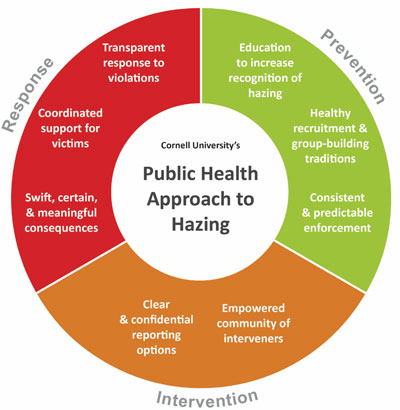Hazing prevention takes campuswide approach
By Nancy Doolittle
On college campuses, hazing is often associated with fraternities and sororities, but national data show that it is a cultural phenomenon encompassing a wide range of risky practices by members of many groups, including academic groups, athletic teams, performing arts groups, clubs and service organizations as well as members of the Greek system.
That’s why a new Cornell University Council on Hazing Prevention, which met for the first time April 10, will take a comprehensive, campuswide approach to hazing, developing strategies to prevent and respond to hazing that involve ongoing coordination and leadership by staff, students, faculty and alumni.
“It is important for the campus community to realize that hazing is not just a concern in the Greek system. Its prevention is the responsibility of all members of the campus community,” said Tim Marchell, director of mental health initiatives at Gannett Health Services and council co-chair.
The formation of the new council is consistent with the recommendations of the RARE (Recruitment-Acceptance-Retention-Education) task force to eliminate hazing within Cornell Greek life, developed in response to President David Skorton’s 2011 challenge to “end the current system of pledging.” The council’s work will assist and be aided by the National Collaborative for Hazing Research and Prevention, led by the University of Maine, whose goal is to identify and develop evidence-based strategies for preventing hazing.
“We have had a longstanding commitment to this issue, yet there is a lot of work to be done,” said Marchell. “We’re taking our efforts to the next level with this council.”
While the prevalence of hazing within student groups at Cornell is lower than the national average – national data report that some 55 percent of students who participate in some type of group have been hazed, compared with Cornell’s 39 percent – “the impact that hazing often has on an individual can be devastating to his or her well-being, both physically and mentally. It can have serious implications for academic performance as well,” said Travis Apgar, associate dean of students for fraternities, sororities and independent living in the Office of the Dean of Students, and council co-chair.
To develop a campus environment that eliminates hazing, the Council on Hazing Prevention, comprised of students, staff, faculty and alumni, will be responsible for:
- studying the campus environment in relation to hazing;
- fostering development, implementation and evaluation of prevention strategies, policies, procedures and services; and
- advising the administration on opportunities to foster cultural change, reduce risks and boost support for members of the community affected by hazing.

The university’s strategic framework for addressing hazing, part of the university’s comprehensive public health approach, includes three main areas of focus: prevention, intervention and response. Using that framework, the council will review current Cornell policies; assess hazing at Cornell and related attitudes, perceptions and practices; and guide the development of education, training and communication initiatives. These initiatives will aim to promote campus understanding of what constitutes hazing; foster pro-social bystander behavior; correct misperceptions about hazing behaviors; and increase knowledge about the role of coercion and consent in hazing.
The council also will promote development of non-hazing activities that achieve the same group goals of cohesion and solidarity that hazing purportedly does, such as membership bonding, developing leadership skills and demonstrating member commitment.
“The work of this council is incredibly important in terms of protecting the health and safety of all students,” Apgar said. “We want to make sure we’re taking good care of our students and providing the best atmosphere for them to succeed.”
Media Contact
Get Cornell news delivered right to your inbox.
Subscribe